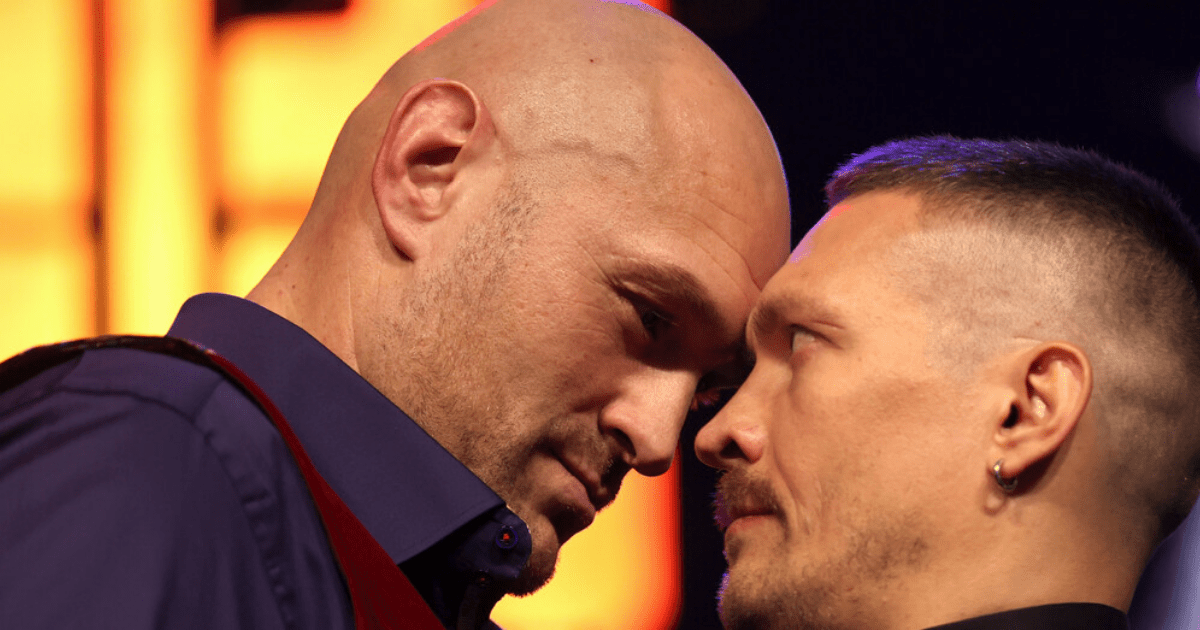Potential Battle of Britain
Tyson Fury could potentially face Anthony Joshua in a Battle of Britain before rematching Oleksandr Usyk, according to his promoter.
Rematch Clause
Fury and Usyk are set to fight for all the heavyweight marbles on May 18 in Saudi Arabia, but Joshua could step in before the rematch with Usyk, as per promoter Bob Arum.
Arum's Comments
Arum stated that if Fury-Usyk turns out to be a classic, a rematch may trump a Joshua fight. However, if it's one-sided, Fury could go straight to Joshua, depending on Saudi boxing kingpin Turki Alalshikh's wishes.
Hearn's Belief
Eddie Hearn also shares the belief that the Fury vs. Joshua fight will happen before the end of 2024, with Hearn suggesting it could even take place this year.

Previous Hurdles
Despite a lucrative two-fight deal signed in 2020, various obstacles, including Deontay Wilder's arbitration and Joshua's recent wins, have delayed the highly-anticipated Fury vs. Joshua showdown.
Frequently Asked Questions
What is required to begin training in professional boxing?
In order to begin professional boxing training, you must be physically fit, have discipline and be willing to learn. The first step in training is to learn the basics, such as footwork, stance, punches and defensive techniques. You should join a reputable gym with trainers who are experienced and understand the nuances in professional boxing competition. Prior to competing, most novice boxers undergo a rigorous training regimen that includes technique drills, sparring, and conditioning.
How important are physical conditioning and training for professional boxers?
Professional boxing requires a high level of physical conditioning. The sport requires high levels of speed, strength, endurance, agility, and endurance. Professional boxers must engage in a tailored fitness program that includes aerobic and anaerobic exercises, strength and resistance training, and flexibility workouts. Boxers’ ability to perform and train effectively in the ring will be compromised if they do not have superior physical condition.
What equipment is essential for someone starting in professional boxing?
If you are just starting out in professional boxing, essential equipment for beginners includes boxing gloves and hand wraps. Also, a mouthguard is necessary, as well as headgear, proper footwear, and a mouthguard. A heavy bag, speed bag, double-end bag, and other training aids are important for technical workouts. You should use durable, high-quality equipment to protect yourself from injury.
How important are mental toughness and professional boxing in the world of sport?
Mental toughness, just like physical conditioning, is essential in professional fighting. The sport requires resilience, focus and the ability to handle stress, as well as the psychological fortitude needed to overcome adversity. Mental preparation is a combination of stress management, visualization and a strong mentality to meet the challenges that are faced in the ring. Mental toughness is essential for a boxer to be able to perform at their best under the pressure of professional competition.
What are professional boxing’s risks?
Professional boxing is a contact sport and as such, it carries risks. These include acute injuries such as cuts, bruises, broken bones, and head trauma, as well as potential chronic conditions from repeated impacts, such as concussion syndromes or neurological disorders. The risks can be reduced with proper training, safety devices, and adhering to boxing rules, but never completely eliminated. It is important to understand and accept these risks before you decide to box professionally.
What kind diet should an amateur boxer follow to improve their performance?
A novice boxer should follow a nutritionally balanced diet that fuels intense workouts and fosters recovery. It is generally recommended to consume a mix of carbohydrates for energy, lean proteins for muscle repair and growth, and healthy fats for overall health. Hydration, vitamins, and minerals are critical as well. Consulting with a sports nutritionist can provide a personalized diet plan that aligns with the boxer’s training regimen and weight class targets.
How does a boxer maintain weight and weight class?
Boxers manage their weight by adhering to strict diets and precise training regimens. Nutritionists will help develop a weight loss plan for boxers that is based on their goals and doesn’t compromise nutrition or training energy. The importance of regular weight check-ins and regular exercise is crucial, especially in the run up to a fight. Weight management can be a strategy that can cause health problems or poor performance if it is not done correctly.
Statistics
- Reports suggest that successful professional boxers can earn upwards of 50 times more than the median purse for entry-level professionals per fight.
- Professional boxers typically train 4 to 6 hours per day, 5 to 6 days a week, depending on their fight schedule.
- A study showed that most professional boxers have spent more than 4 years in training before their first professional bout.
- An analysis of boxing injuries suggests that 90% involve the head, neck, and face, emphasizing the importance of protective gear.
- Nutrition experts emphasize that over 70% of a boxer’s diet should focus on carbohydrates and proteins for energy and recovery.
- Around 60% of professional boxers supplement their income with other activities or jobs, due to variability in fight earnings.
- Research shows that a boxer’s reaction time is typically under 0.25 seconds, honed through repetitive drills and sparring.
External Links
proboxing-fans.com
wbcboxing.com
teamusa.org
ringtv.com
boxingnews24.com
precisionstriking.com
boxingnewsonline.net
How To
How to improve Boxing Defense
The importance of improving your defense in professional boxing is equal to that of perfecting your offense. Include drills that emphasize head movement, footwork and blocking. Practice regularly slipping, bobbing, weaving, and angles in order to evade punts. Use defensive maneuvers during sparring sessions to create muscle memory under live conditions. You should reflect on your sparring and identify your defensive weakness. Then, work with your coach in order to overcome them. Your ability in defending effectively can make a big difference to the outcome.

